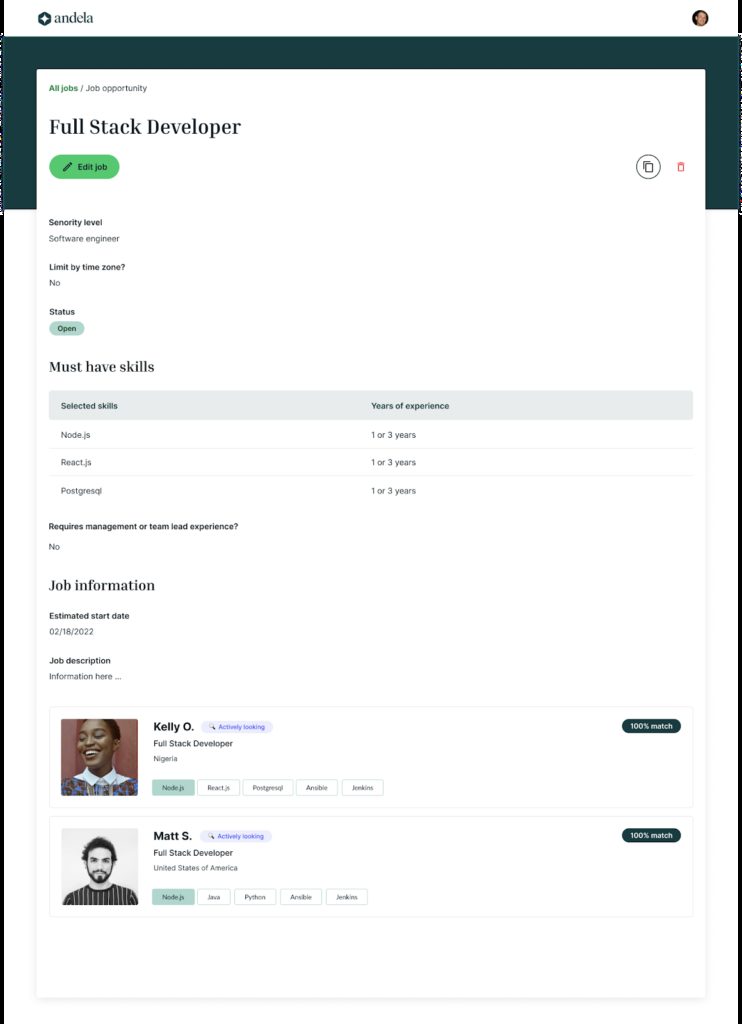To date, Andela has helped companies build their remote engineering teams by giving them access to vetted software engineers from over 100 countries, counting among its clientele leading companies like GitHub, Goldman Sachs, and Cloudflare.
But on Wednesday, the global talent company said it is expanding its offering beyond engineering talent to include matching in new practice areas: specifically design, data, and product management.
“Having worked across the continent and beyond, we know that the tech ecosystem does not just need only engineering talent,” Agnes Muthoni, Director of the Andela Learning Community, said on the move. “It’s very rare that software engineers work entirely independently. It takes a variety of skill sets and expertise to make technical solutions that work.”
The onboarding process for the new set of technical talent will be similar to Andela’s existing model, consisting of English language and soft-skills assessments, technical assessments, and a portfolio review. But within the latter two, there will be some variance.
“Where a software engineer will typically complete a coding challenge and peer code review, a designer may complete a project or do a portfolio walk-through and critique,” Muthoni told TechCabal in an interview.
The expansion of Andela’s offering coincides with the launch of its new platform for talent matching, which the company says is designed to create a “more direct and personalised hiring experience” for both talent and recruiters.
Till now, Andela has employed a hands-on matching process to help clients scale their technical team, which involves sifting through resumes and screening calls, and typically takes several weeks to complete.
Companies now have the option of using the self-service platform which, according to Andela, cuts down the hiring lifecycle for hiring managers and recruiters to as little as 48 hours.
“The need to build scalable teams that can grow together when miles apart is increasingly apparent. Using the platform, hiring managers can find and hire their ideal candidate in two days or in less than two weeks, 70% faster than traditional in-house recruitment,” Muthoni said.

Hiring managers simply have to create a company profile, post a job, and can see curated and vetted candidates instantly. Talents can also see how well their skills match up to roles, with both parties having access to visualise compatibility, including overlap in skills and preferences.
“Each assessment and onboarding path gives a better indication of the kinds of teams they will be successful in,” Muthoni said. “Technologists only need to test once instead of for each client or role, allowing hiring managers to focus on team fit instead of skills reviews. It simplifies the time commitment on both sides and increases the likelihood of a successful match.”
According to Andela, the matching accounts for depth and breadth of skill requirements, timezone and working hour overlaps, industry expertise, and team fit. In addition, the platform uses data-driven technology and algorithms to make smart match recommendations.
“The Andela platform is constantly learning, helping to refine its personalised recommendations. As users accept or reject recommendations, they are also asked for specific feedback. With each bit of feedback, the platform becomes more personalised,” the company explained in an official statement.
When it comes to platforms, personalisation has become a “basic expectation”, notes Jeremy Johnson, CEO and co-founder of Andela.
“Amazon, Apple, and Netflix have changed every aspect of our lives—from how we shop to how we consume culture and everything in between. This is why we’ve built our new platform—to help talent find jobs that match their technical skills and careers that match their lives,” he said.
On whether Andela plans to phase out its initial model permanently, Muthoni noted that there will always be a need for a hands-on human-first matching process with the self-service platform launched only to give clients an option that helps them move through the recruitment cycle quickly.
“What this means is Andela’s clients can now choose their preferred service – the existing white-glove hands-on supported approach or rapid self-service through their new platform.”
Alongside its expanded offerings and new platform, Andela has also unveiled a new brand identity meant to “better reflect the evolution of both the company as well as the global talent industry that it has helped to spawn.”
These announcements come 6 months after Andela closed a $200 million Series E. The round—led by Softbank Vision Fund 2, the venture capital arm of Japanese conglomerate SoftBank—valued the company at $1.5 billion, cementing its place as one of Africa’s unicorn startups.
Launched in Nigeria in 2014, Andela started as an African-focused software developer training and outsourcing company. Notorious for being harder to get into than Harvard, Andela grew to become a premier source for talented, well-rounded developers in Africa thanks to its curriculum and developer training methodology.
Through its Andela Learning Community, it claims to have provided training and career opportunities for over 175,000 engineers globally at different stages of their careers.
If you enjoyed reading this article, please share it in your WhatsApp groups and Telegram channels.




















